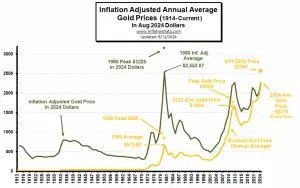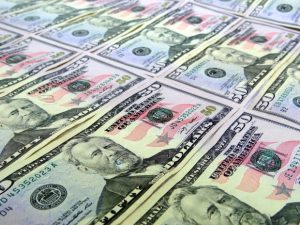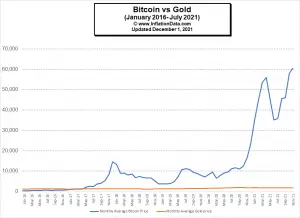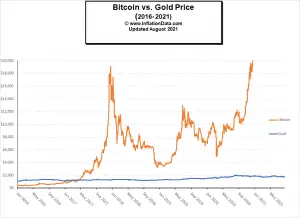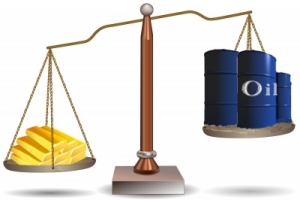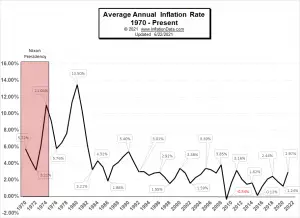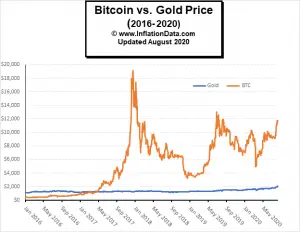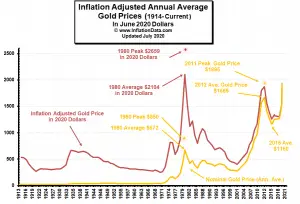The U.S. Bureau of Labor Statistics released its August Inflation report on Wednesday September 11th showing Annual Inflation was down from 2.9% in July to 2.5% in August. (But since we calculate it to two digits, it was actually 2.89% in July and 2.53% in August.) On a non-seasonally adjusted basis, monthly inflation in July was 0.12% and 0.08% in August. Gold Prices: Contrary to what you might expect the day after the release of the lower inflation numbers Gold rallied to $2554 by mid-afternoon. I've often said, Gold is a crisis hedge NOT an inflation hedge. This is primarily because there is no "counterparty risk" i.e., it is strictly an asset not simultaneously someone else's … [Read more...]
4 Key Factors to Consider When Hedging Against Inflation
The FED's target yearly inflation rate in the U.S. is about 2%, but the long term average is more like 3% and depending on ongoing economic conditions, this rate can significantly increase, affecting the financial health of individuals across the country. Though keeping an eye on the economy can help you make decisions to brace against the impact of inflation, developing sound investments can help you protect your wealth no matter the rate. Take a look below for a few central items to consider when preserving your finances against inflation. Diversify your Portfolio Portfolio diversification is crucial for maintaining optimal financial health. Your investments should vary in asset class … [Read more...]
Is There an Optimum Growth Rate of Money?
It is widely held that a growing economy requires a growing money stock because economic growth increases demand for money. Many economists also believe that failing to accommodate the increase in the demand for money leads to a decline in consumer prices. This could destabilize the economy and produce an economic recession or even a depression. Some economists who follow Milton Friedman—also known as monetarists—want the central bank to target the money supply growth rate to a fixed percentage. They hold that if this percentage is maintained over a prolonged period, it will create economic stability. The idea that money must grow to support economic growth implies that money sustains … [Read more...]
Analyzing 5 Ways You Can Hedge Against Surging Inflation
Inflation in the U.S. has reached levels not seen since the 1980s. That means that millennials have never seen inflation this high. Consequently, they are probably unaware of not only how devasting inflation can be, but also about the best ways to hedge against surging inflation. Simply stated, inflation ravages purchasing power, and the higher the inflation rate, the quicker purchasing power is destroyed. Even if you receive a cost of living (CoL) raise it is usually "too little too late" just like the FED's recent attempts to fight inflation. The reason a CoL raise doesn't help much is because it is a lagging entity. In other words, even if you get a raise equal to the actual level of … [Read more...]
Is Bitcoin a Better Inflation Hedge Than Gold?
Proponents of the digital cryptocurrency Bitcoin are touting it as the latest Inflation hedge... perhaps better than gold... but is it? Although gold may fluctuate significantly in the short run, this precious metal has fared relatively well as a hedge against inflation over the long term. One of gold's significant benefits is that it is a commodity that if held in physical form is neither paper, nor government-controlled, nor another person's liability. Gold's other major advantage is its limited supply (i.e., requiring quite a bit of effort and energy to mine). Recently, Bitcoin has arrived on the scene and become a "digital commodity" independent of the government, which has gained … [Read more...]
Safe-Haven Investments that Protect Your Capital From Rising Inflation
How the Pandemic Created Inflation Given the current state of affairs and how the Covid-19 pandemic has impacted the global economic outlook, an unconventional recession has emerged, prompting many governments to inflate the money supply to counteract the artificially suppressed economic activity. In many countries, this inflated money supply has resulted in consumer price inflation and resulted in investors seeking a safe haven investment. When there's a high level of inflation, economic uncertainty, or financial markets are in turmoil investors flock to safe-haven assets. The rationale is that in times of crisis when most traditional investments are losing value, safe-haven assets tend … [Read more...]
Oil vs. Gold- Why Compare Commodity Prices Against Each Other?
When we think of inflation we generally think of "Price Inflation" i.e. how much the price of a good or service has increased in dollars. However, price inflation is not "monolithic" that is, they don't all increase at exactly the same rate. Some prices will increase faster or more than others. So it is often useful to compare the price of one commodity to another to see the relative increases of each. Over the years we have compared a variety of different commodities including Gasoline vs. Oil and Oil vs. Bitcoin. We've even done a 3-way comparison of Gold vs. Dollar vs. Bitcoin. But since gold is historical money it is useful to use it as the standard yardstick. So we have updated … [Read more...]
How Does a Country “Export” its Inflation?
This question is interesting because most countries can’t just export their inflation because their currency is exclusive to their country. However, the U.S. is in the unique position of being the “reserve currency” of the world. In addition, several countries like Panama, Ecuador, and Zimbabwe, actually use the U.S. dollar as their currency and don’t even have their own currency at all. So the U.S. currency has a greater than normal influence on other country's economies. Exporting inflation is a Government's dream scenario. If they could print all the money they wanted and not suffer the consequences of their actions, it would be a dream come true for politicians. Printing money boosts … [Read more...]
Gold vs. Dollar vs. BitCoin Revisited
Back in 2016, we compared the properties of three types of currency, i.e. Gold, Dollars (Cash), and Bitcoin. Today we'd like to look at how each has fared since then. Back then, we said that there are 10 factors that make up a good store of value. They are: 1. Scarcity- For something to be considered valuable it can’t be too readily available. 2. Fungibility- Things have to be equal. Rare paintings aren’t fungible a Picasso isn’t exactly the same as a Monet. As a matter of fact, one Picasso isn’t even the same as another Picasso. Artwork isn’t fungible. One dollar bill is pretty much the same as another, one ounce of 24 karat gold is the same as another, one bitcoin is the same as … [Read more...]
3 Factors Causing the Current Gold Rally
A variety of factors affect the price of gold. Currently, many of them are combining to drive the price of gold to all-time record highs. Let's look at a few of the factors that affect the price of gold. 1) Uncertainty- Gold is a Crisis Hedge We have said this many times over the years but it bears repeating again gold is more of a crisis hedge than an inflation hedge. When uncertainty rears its ugly head... gold does well. That uncertainty can take many forms and one of them is "monetary uncertainty". So if people don't know what the value of their money is going to be in the future (i.e. inflation) they will shift some of their assets to gold (driving up the price of gold). So as far as … [Read more...]

